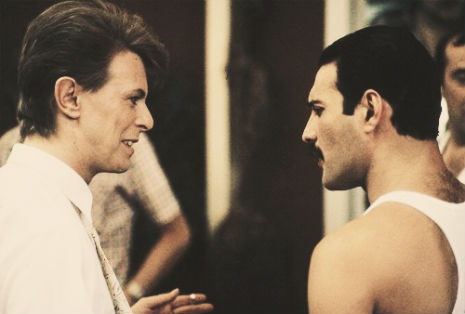
Freddie Mercury first met David Bowie in the summer of 1970, when he was trying to sell Bowie a pair of suede boots. Mercury co-managed a stall in Kensington Market, with Roger Taylor, and while Bowie tried on the footwear, Mercury quizzed him about the music business. David was disenchanted and asked Freddie, ‘Why would you want to get into this business?’
Over the next decade, Mercury and Bowie’s paths crossed—Queen hired Mick Rock, the man whose photographs made Bowie an icon, to shoot their equally iconic cover for Queen II—but it would not be until the summer of 1981 that Queen and Bowie worked together.
In his biography of David Bowie, Starman, Paul Trynka described what happened next:
According to Mercury’s personal assistant Peter Freestone,Bowie only realized Queen were in Mountain [recording studios] working on their R&B-flavored album Hot Space by chance. Asked to add backing vocals on the song “Cool Cat,” David stayed for a marathon session in which Queen’s song “Feel Like” was transformed into “Under Pressure.” David contributed the bulk of the lyrics, set over drummer Roger Taylor’s descending chord sequence. By now, Mercury had developed more of an ego than in his market-stall days, and it was Queen’s drummer who was at the heart of the session, interacting with the interloper. ‘Roger and Bowie got on very well,’ according to Freestone, ‘although the lyrics and title idea came from Freddie and David.’
...
‘It was hard because you had four very precocious boys—and David, who was precocious enough for all of us,’ says Brian May. ’ David took over the song lyrically. |t’s a significant song because of David and its lyrical content—I would have found that hard to admit in the old days—but I can admit now.’ David championed the song, encouraging Freddie, and contributing a classic, swooping melody, as well as one of his own distinctive, reflective middle-eight sections (‘the terror of knowing what this world is all about.’)
Queen were uncertain about the track, even after Bowie and Mercury re-worked their vocals and mixed the recording at The Power Station in New York, a fortnight later—John Deacon’s distinctive bassline was added at the same session, hummed to him by David. Brian was particularly unhappy, recalling the ‘fierce battles around the mix, and his own misgivings about the song’s release as a single; instead it was Queen’s record company, EMI, that pushed the collaboration…
This, of course, is Bowie’s biographer’s take. Queen bassist, John Deacon said in 1984 that the song was primarily Freddie Mercury’s, and developed out of a jam session. Also, the song Trynka quotes as the original “Feel Like,” is a separate track by Roger Taylor. Also, Hot Space was more Disco than R&B.
Yet, it is true that most of the song “Under Pressure” came out of a ‘marathon session,’ which explains Mercury’s incredible, improvised vocals. Open Culture gives a slightly different version of events:
“David came in one night and we were playing other people’s songs for fun, just jamming,” says Queen drummer Roger Taylor in Mark Blake’s book Is This the Real Life?: The Untold Story of Freddie Mercury and Queen. “In the end, David said, ‘This is stupid, why don’t we just write one?’”
And so began a marathon session of nearly 24-hours–fueled, according to Blake, by wine and cocaine. Built around John Deacon’s distinctive bass line, the song was mostly written by Mercury and Bowie. Blake describes the scene, beginning with the recollections of Queen’s guitarist:
‘We felt our way through a backing track all together as an ensemble,’ recalled Brian May. ‘When the backing track was done, David said, “Okay, let’s each of us go in the vocal booth and sing how we think the melody should go–just off the top of our heads–and we’ll compile a vocal out of that.” And that’s what we did.’ Some of these improvisations, including Mercury’s memorable introductory scatting vocal, would endure on the finished track. Bowie also insisted that he and Mercury shouldn’t hear what the other had sung, swapping verses blind, which helped give the song its cut-and-paste feel.
The ‘fierce arguments’ took place during the mix. Queen’s engineer Reinhold Mack is quoted by Blake as saying ‘It didn’t go well.’:
“We spent all day and Bowie was like, ‘Do this, do that.’ In the end, I called Freddie and said, ‘I need help here,’ so Fred came in as a mediator.”
Mercury and Bowie argued. Then Bowie threatened to block the release of the single. It never happened and “Under Pressure” by Queen and David Bowie was released in September 1981. It was Queen’s second number one, making the top of the UK charts on 21 November. In America, it reached number twenty-nine a few weeks later. It is now recognized as a classic song, though Brian May would still like to re-mix it.
This is the Freddie Mercury’s and David Bowie’s isolated vocals from the recording of “Under Pressure.”
Thanks Richard Metzger! Via Open Culture





